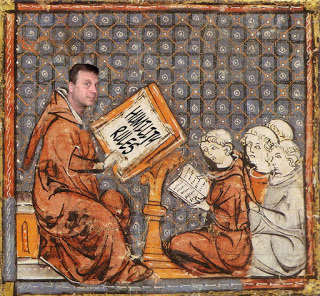Augustine Wetta's Blog, page 3
October 13, 2020
EVIL
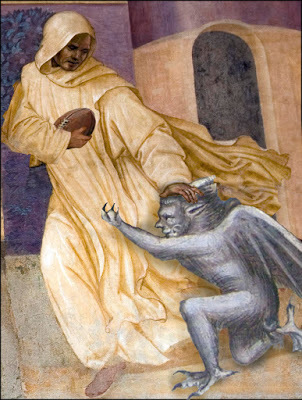
I like to joke with my Junior Ethics class that it is my job as a priest to make sure that none of them ever have fun. As with most jokes, there is some truth in it. Being bad is often fun. Otherwise, everyone would be good wouldn’t they? However, it’s only fun in the short term. In the long term, being bad makes you miserable. So while it may appear that I am trying to keep my students from having fun, in fact, I am trying to teach them what I (and countless other stupid people before me) have learned from experience, namely, that every evil choice we make costs us some of our God-given freedom—and it is precisely “for freedom [that] Christ set us free”.
The truth of this, however, is hard to get our heads around. Ever since Adam’s fall, we have thought of our freedom as the ‘power’ to choose between good and evil. But that power is an illusion because every evil choice makes us a little less free.
Saint Augustine used this riddle to explain the enigma of evil’s fake freedom: “What,” he asked, “was the motive for the very first sin?” [Not the sin of Adam, mind you (we know his motive) but the sin of Lucifer—what was the motive of that very first evil deed?] Bear in mind that Lucifer, in his pre-fallen state was perfectly happy, perfectly content, perfect in every way that a perfect creation can be. Because everything God makes is perfect and good. The answer, reasoned Saint Augustine is that the motive for that very first evil act was…wait for it…nothing! Evil is a vacuum. It’s something that should be there, but isn’t. So that makes sin is a “misdirected good.”
As Saint Thomas Aquinas was fond of pointing out, when people do bad things, they are, in fact, pursuing a lesser good at the expense of a higher one. I like candy. Candy is good. I steal candy so I can taste that goodness—but if I steal that candy from a baby, I lose some of my humanity in the process. And the more babies I steal from, the less human I become.
That’s not a good example. My point is—and I’ll say it again—that with every sin, with every evil choice we make, we actually lose some of our freedom. “So stand firm and do not submit again to the yoke of slavery.” Confess your sins, give alms, and behold, everything will be clean for you.”
October 11, 2020
Predictions and Prophecies
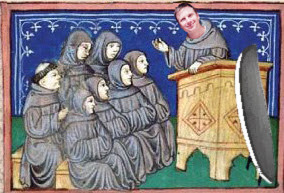
In 2005, Philip Tetlock, a psychologist at the University of Pennsylvania, completed a twenty-year study on predictions.
“Tetlock interviewed 284 people who made their living “commenting or offering advice on political and economic trends.” He asked them to assess the probabilities that certain events would occur in the not too distant future, both in areas of the world in which they specialized and in regions about which they had less knowledge. Would Gorbachev be ousted in a coup? Would the United States go to war in the Persian Gulf? Which country would become the next big emerging market? In all, Tetlock gathered more than 80,000 predictions. Respondents were asked to rate the probabilities of three alternative outcomes in every case: the persistence of the status quo, more of something such as political freedom or economic growth, or less of that
thing.
“The results were devastating. The experts performed worse than they would have if they had simply assigned equal probabilities to each of the three potential outcomes. In other words, people who spend their time, and earn their living, studying a particular topic produce poorer predictions than dart-throwing monkeys who would have distributed their choices evenly over the options. Even in the region they knew best, experts were not significantly better than nonspecialists.” (Thinking Fast. Thinking Slow, Daniel Kahneman)
The reason I’m starting my homily with this disconcerting lesson in human error is because I’ve spent the last week making my own predictions: when a vaccine will be found, what will happen if so-and-so gets elected, whether or not we’ll get a supreme court justice, where the next riot will break out…what will happen to my senior Theology students if they don’t start turning in their blasted homework…. None of this makes me feel any better. Yet I keep doing it, because in “these uncertain times” making confident predictions about the future calms me. Admittedly, the calm doesn’t last long. I know deep down that human predictions are about as dependable as dart-throwing monkeys—and perhaps more dangerous.
Our readings this Sunday are predictions of a different sort. “The LORD of hosts will provide…” says Isaiah, “he will destroy the veil that veils all peoples… he will wipe away the tears from every face…he will remove the reproach of his people…on that day it will be said: Behold our God…” (IS 25:6-10A). The Psalmist too makes predictions: “I shall not want” he says, “I shall dwell in the house of the Lord all the days of my life” (PS 23:1-3A, 3B-4, 5, 6) And Saint Paul makes a prediction for the Philipians: “My God will supply whatever you need” (PHIL 4:12-14, 19-20)
Herein lies the difference between prediction and prophecy: that the first puts frail and fallible humans in charge of our future, while the second entrusts that future to God. It’s very similar to the difference between magic and miracle; it’s a question of where we put our trust.
Jesus himself, after all, makes a prediction in todays gospel: “There will be wailing and grinding of teeth,” he says. Jesus, you see, is more concerned with keeping us good than keeping us calm. And that’s what happens when you surrender to the uncertainty so as to live the present moment. That’s what happens when you submit in humble docility to God’s will: you get peace and joy—but not necessarily comfort or happiness. “If I did not simply live from one moment to another,” wrote Saint Therese of Liseux, “it would be impossible for me to be patient, but I look only at the present, I forget the past, and I take good care not to forestall the future.”
So let’s stick to the present moment: “Many are invited, but few are chosen,” says Jesus (Mt 22.14) You are invited. I am invited. Here we are in the sacrament of this present moment. “There is not a moment,” wrote Jean-Pierre de Caussade, “in which God does not present Himself under the cover of some pain to be endured, of some consolation to be enjoyed, or of some duty to be performed. All that takes place within us, around us, or through us, contains and conceals His divine action.”
We are here at the wedding feast. Many are invited, but we are chosen. “May the Father of our Lord Jesus Christ enlighten the eyes of our hearts, so that we may know what is the hope that belongs to our call.”
“In the Name of the Father and of the Son and of the Holy Spirit…”
July 29, 2020
The Feast of Saint Martha
 Jesus entered a village where a woman whose name was Martha welcomed him. She had a sister named Mary who sat beside the Lord at his feet listening to him speak. Martha, burdened with much serving, came to him and said, “Lord, do you not care that my sister has left me by myself to do the serving? Tell her to help me.” The Lord said to her in reply, “Martha, Martha, you are anxious and worried about many things. There is need of only one thing. Mary has chosen the better part and it will not be taken from her.
Jesus entered a village where a woman whose name was Martha welcomed him. She had a sister named Mary who sat beside the Lord at his feet listening to him speak. Martha, burdened with much serving, came to him and said, “Lord, do you not care that my sister has left me by myself to do the serving? Tell her to help me.” The Lord said to her in reply, “Martha, Martha, you are anxious and worried about many things. There is need of only one thing. Mary has chosen the better part and it will not be taken from her.I can't help feeling a little sorry for Martha. Saint Luke tells us she was “burdened with much serving.” Hadn’t Jesus himself said: “Come to me, all you who labor and are burdened”? Well, she did. And look what she get for her efforts.
“Martha, Martha,” says Jesus in a tone that even in writing seems a little condescending, “you are anxious and worried about many things.” Well, who is she doing all the serving for anyway? And if you’ll think back to our gospel reading from a few weeks ago, you might remember what Jesus said to Simon the Pharisee when he dined at his house: " When I entered your house, you did not give me water for my feet…you did not give me a kiss…you did not anoint my head with oil…” Here’s Martha washing and oiling and everything else. And for that, she’s scolded while Mary gets all the credit for being a loyal disciple. I wonder what would’ve happened if she had said to Jesus, “Fine. I’ll just sit here next to Mary. You can feed yourself. Make your own bed. Eat off dirty dishes.”
Would some of the other disciples have gotten out of their seats and pitched in? Would Jesus have changed his mind? Or would he have multiplied some loaves and fishes, changed the water into wine and had some angels do the washing up? We’ll never know, of course, because Martha said what she said and all we have is Jesus’s response.
Still…I can’t help wondering if she was really at fault. There are, of course, many different ways to read this passage. The traditional way is to think in terms of lower and higher vocations: Martha is the ‘active’ Christian worried over the things of this world, and Mary is the contemplative, already enjoying the beatific vision. That’s not a bad way to interpret it. Saint Ambrose read it this way. But notice also that Jesus doesn’t tell Martha to stop working—or even to stop worrying—only to leave her sister alone.
Saint Bernard read the passage a little differently. “let Martha welcome the Lord into her house,” he wrote, “since to her is entrusted the direction of the household… Let those who share her tasks also receive the Lord, each according to their particular service. Let them welcome Christ and serve him, helping in the person of his members the sick, the poor, travelers and pilgrims. And while they are undertaking these ministries, let Mary remain at rest.” Mary gets to rest while Martha works,
But without Martha, Mary loses her place at the feet of Jesus. You can’t have contemplation without action. So there wasn’t anything wrong with Martha’s service per se. What was it, then? Her resentment? Again, we can’t blame her for being frustrated. She’s the only one doing the chores.
No, what’s lacking in her service is obedience.
When I was working on the Beach Patrol, I was told a story about a boy who slipped off the 53rd Street Pier. Instead of signaling to the lifeguard (who was no more than twenty yards away), his father jumped in after him, and pulled him to shore by the hair. As it turned out, the child had broken his neck in the fall. He might have survived, but his spinal cord was severed when his father tugged on his hair. So you see, even good works can do harm if they are done in the wrong way. And the only safeguard against making this kind of mistake is the virtue of obedience.
We can’t blame Martha for wanting to help. But maybe we can blame her for not asking first. Let us pray that when we choose to serve, we do so in obedience; when we give a gift, we give what is truly needed; and when we act, we do so in a manner that is consistent with God’s Will. But most of all, let us pray for the good sense to ask Jesus first. Because we can smile a little at Martha’s resentment, but we have to give her this much credit: she had the presence of mind to bring that resentment straight to Jesus.
July 28, 2020
Umar Lee and Me
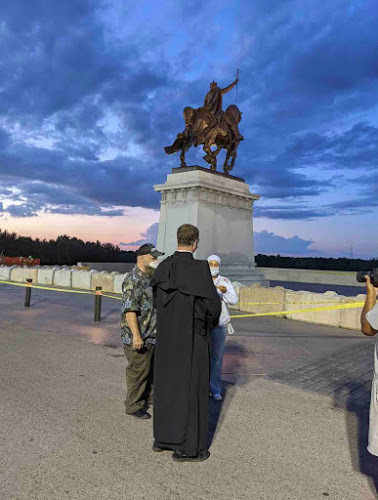 Umar Lee, and Moji Sadiqi, and Me
Umar Lee, and Moji Sadiqi, and Me
(Thanks to Tony Rice for the photo!)
For the last two weeks, I have been driving over to Forest Park in Saint Louis, Missouri to pray the rosary beside a statue of our patron saint, the thirteenth century crusader king, Louis IX. I’ve been going there to pray because Umar Lee wants to tear it down. He says Saint Louis was antisemitic and Islamophobic, and there appear to be more than a few people who agree with him. I don’t know much about thirteenth century religious sensibilities, so I leave it to historians to sort out Louis IX’s culpability, but I get nervous when people start defacing artwork. So too, I saw the videos online of old men being punched and priests being shouted down, and I figured that if dialogue wasn’t an option, at least I could be there to pray.
When I arrived at the statue around a quarter to seven last Sunday, there were over a thousand people already there. Most were praying their rosaries, but there were also banners and flags and armed security. It felt more like a rally than a prayer. I have nothing against rallies. But I wasn’t there to protest, so I found myself on the fringe of the group. One person I talked to mentioned “a line in the sand,” another spoke of “standing up for ourselves,” so I backed further and further away. I had about a hundred copies of the Prayer of Saint Francis, and I resolved to read the prayer quietly to myself: “Make me a channel of your peace. Where there is hatred, let me sow love…”
I backed so far up that by time the rosary ended, I looked around and noticed that no one around me was praying. These didn’t feel like “my people”—they were a strange mix of hipsters and Muslims and inner city youth: blue hair, piercings, long beards and hijabs. Dressed in full monastic habit, I felt out of place. I turned to the kid on my left. He had long dread locks, and his arms were covered in tattoos. “So…what do you think?” I asked.
“I think there are some racists in that group,” he answered.
I looked back at them. “Well…there probably are,” I said. “But then again, I think you can find bad people in just about any group.”
He nodded.
I smiled, though I doubt he could tell because I was wearing a face mask. Pretty much everyone was wearing face masks. No one wants to get sick. “You’re not here to pray the rosary?”
“Nope. You some sort of religious person?”
“Well now,” I said, “are you stereotyping me just because of the way I’m dressed? A man can’t wear a black hoodie in public any more without being judged?”
He laughed, and the kid on his left laughed, and just like that, we were talking about racism and religious convictions and white privilege and police brutality and Ferguson and Black Lives Matter and Marxism and class warfare... He admitted that he had never been roughed up by the police, and I admitted that his dread locks and tattoos kind of frightened me. “I’m not a Marxist,” he said, “and I don’t really care whether that statue stays or goes. I just wanted to be here in case some of these white nationalists get out of line.”
“This Umar Lee character, though…he’s kind of a bad guy, though, right?”
“Ask him yourself,” my friend with the dreadlocks answered. “He’s standing to your right.”
“Nice to meet you,” said the burly, bearded, megaphone-wielding man to my right.
I figured at this point, I had nothing to lose. “Mister Lee, I read online that you are a violent, evil man.”
“And you believe everything you read online?”
“You were in the news.”
“And the news always gets the Catholic Church right?”
He had a point.
“Do I seem like a violent, evil man to you?” He looked surprisingly calm. Not quite the ‘radical Islamic extremist’ I had read about.
“Honestly, the beard scares me a little,” I said, “but you seem okay to me.”
He nodded, smiled, and moved to pat me on the shoulder, then thought better of it. Coronavirus.
“I’ll pray for you,” I said.
“You can pray with us,” he answered, and before long, I was handing out copies of the prayer of Saint Francis. The Muslims in the group were particularly enthusiastic. Moji Sadiqi handed me a bottle of water. Then a megaphone. I looked around. There were photographers present. I could imagine the look on my abbot’s face if my photo made the news the next day leading a protest.
“Honestly,” I began, “I don’t think I agree with most of what you stand for, so I came here expecting to be yelled at or spit on—or worse. And even now, I’m a little scared. But Jesus told his followers ‘whoever gives only a cup of cold water to one of these little ones because he is a disciple… he will surely not lose his reward.’ And a few minutes ago, you offered me exactly that. So if you’re here to pray, then I’m honored to pray with you. Because I do believe that black lives matter.” Then we all prayed together:
“Lord, make me an instrument of your peace:
where there is hatred, let me sow love;
where there is injury, pardon;
where there is doubt, faith;
where there is despair, hope;
where there is darkness, light;
where there is sadness, joy.
O divine Master, grant that I may not so much seek
to be consoled as to console,
to be understood as to understand,
to be loved as to love.
For it is in giving that we receive,
it is in pardoning that we are pardoned,
and it is in dying that we are born to eternal life.”
I still don’t particularly like a lot of what Umar Lee has to say. I’m guessing he’s not a big fan of Catholic theology. But next Thursday, just outside my hermitage, he and I are having coffee. So maybe there’s room for dialogue after all.
July 11, 2020
The Feast of Saint Benedict
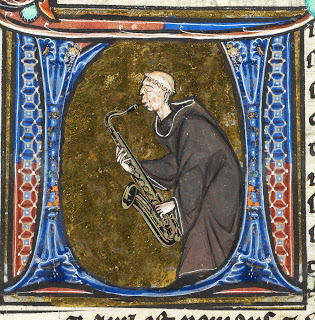 If you ask me (and no one has, but that won’t stop me), I’d say there are three things our society needs right now:
If you ask me (and no one has, but that won’t stop me), I’d say there are three things our society needs right now:
In the midst of all the noise and distractions, we need Silence
In the midst of all the uncertainty and disorder, we need Stability
In the midst of all the anger and confusion, we need Obedience
In the midst of godlessness and self-righteousness, we need Conversion
Our civilization appears to be teetering on the edge of a great decline. But even a cursory look at history, shows us that this has happened many times before. And every time it does, the Benedictines (monks, nuns, and oblates alike) heave a great, collective sigh and save civilization.
And somehow, this surprises everyone.
But saving civilization comes at a cost. The symbol of the Benedictines is the word, “peace” surrounded by a crown of thorns. The monks, and all the good people who stand beside them, are at war. And there has never been a war without casualties.
So today, on the feast of Saint Benedict, we pray especially for his sons and daughters:
Where there is noise, may they bring silence.
Where there is uncertainty may they bring stability.
Where there is confusion, may they bring obedience.
Where there is godlessness, may they bring conversion.
In the name of the Father, the Son, and the Holy Spirit.
July 3, 2020
Shouts and Threats and Blows
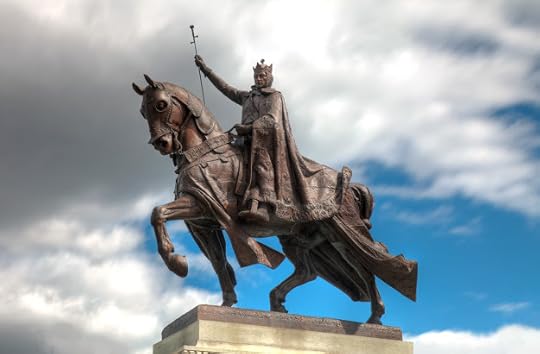
Saint Louis has been in the news again. We were told repeatedly that protesters “clashed” over the removal of the statue of our patron saint. If you were following the news, you saw photographs of people shouting at one another. Exchanging threats. Exchanging blows.
I wasn’t there on Saturday when those things were photographed. But I was there every evening for the rest of the week to say a rosary with about a hundred or so Catholics. Initially, I went there to support those who were praying at the statue. But I returned night after night because of the conversations I had on the way back to my car afterward—not with fellow Catholics, but with people who seemed to disagree with what I was doing.
David
On Tuesday, as I was returning to my car, I was stopped by a man who asked me, “Would you mind having a civil discussion about that statue?”
How can you turn down a request like that? Why would you want to? “I wouldn’t mind a bit,” I said. “I’m not entirely sure where I stand on Louis IX as a person, because I just don’t know that much about him. But I do get very nervous when folks start destroying artwork, and I also figure that anger needs to be met with prayer. What do you think about the statue?”
“I’m Jewish,” he said, “and I want it taken down. That king of yours was responsible for genocide against Jews. You wouldn’t approve of a statue of Hitler, would you?”
“No, I wouldn’t,” I said. “How many Jews did Louis IX kill?”
He paused in thought for a moment. “Honestly, I don’t know,” he said. “A friend told me that, and I just believed him.”
His candor was so disarming, I started defending his position. “Well, you can’t research every detail of everything you’re told,” I answered, “but if you trust the guy who told you that, then I’ll go home tonight and look into this—I mean really look into it, not just find Catholic sources that I already agree with—and if it turns out that your friend had his facts straight, then…well…I’ll come back and help take it down myself.”
He smiled. “I’m going to do that, too—go look into it, I mean. Oh! And by the way, my name is David.”
I talked with David for about half an hour and we couldn’t seem to find anything else that we disagreed on. “It’s my birthday,” he said as we parted ways.
“Happy birthday,” I said. He smiled again, and that’s the last I saw of him.
Janet
The next evening, as we were praying, I noticed two African-American women standing at a distance, watching us. I don’t think they were there to protest, but one of them looked angry. Or maybe she was just uncomfortable. It was hard to tell. I didn’t quite know what to say as I walked past, so I just nodded and said, quietly, “You know, black lives really do matter.”
Suddenly, she didn’t look angry so much as very, very sad. She looked like she might be on the verge of tears. “Thank you,” she said, “And you know, all lives really do matter.”
And then, somehow, we were smiling at one another. She introduced herself as Janet. “I’d hug you,” she said, “but…you know…the whole Caronavirus thing.”
“I’ll take prayers instead,” I said.
“You got them,” she answered, “Pray for me too.”
Saint Louis, King of France
I had conversations like this every night, and not once did we come to blows. No one threatened me. I talked with an African-American man and his daughter, I talked with another Jewish man, and I talked with two gay joggers (I’m assuming they were gay because one of them wore a t-shirt that said, “I’m gay” on it). And in every case, we parted friends. Not just friendly, mind you, but friends.
Now…for the record, Saint Louis did have copies of the Talmud collected and burned. He did expel Jews from France. As a twenty-first-century Catholic, I am not proud of that. The Jewish people are, in the words of Pope Benedict XVI, “our fathers in faith”. So it’s hard to imagine a saint doing such a thing. And Saint Louis did lead two crusades against Muslim armies in the East. If he did those things today, I’d agree that he was, as his critics suggest, antisemitic and Islamophobic.
But, given that Europe had been at war with the Saracens for six hundred years, I think he can be excused for fearing them. They were serious warriors. And perhaps we can find fault with Saint Louis for not establishing freedom of religion in thirteenth century France; but there was no freedom of religion anywhere in the world until the founding of Rhode Island. So I’m not sure he could have known better. Still, for the sake of my friend, David, I’ll keep reading. I hope he is somewhere, reading up on Saint Louis as well.
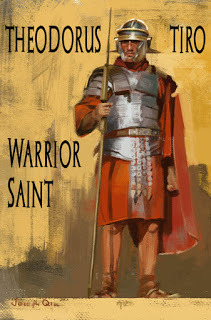
Saint Theodorus Tiro
A few months agao, I was giving a retreat in Bremerton, Washington, and a big fellow with a handlebar mustache and tattoos all up and down his arms came up to me after my sermon and told me about Saint Theodorus “Tiro”—the patron saint of interreligious dialogue (or so he said). Theodorus joined the Roman army in 304 AD, and had no sooner taken a uniform than his cohort was ambushed. Theodorus, apparently, was so brutal, so vicious, such an excellent warrior, that his fellow soldiers started referring to him as “the recruit.” (tiro in Latin). Anyhow, after several years of this, he discovered Christianity and converted. The problem was that Roman soldiers—indeed all Roman citizens—were required to offer sacrifices at the local temple. Theodorus refused. “That’s alright,” his buddies said, “Just walk past the temple, and we’ll assume you made the sacrifice.” **Wink. Wink.**.
Well, Theodorus walked out to the temple of Cybele, alright. And while he was there, he burned it to the ground. Now, the interesting thing about his story is that his buddies seemed genuinely sorry to have to execute him, and he seemed genuinely okay with them doing it. In so many words, his fellow soldiers apologized for having to do their job, and Theodorus understood that they were in a bit of a pinch and forgave them. “So,” says my friend with the tattoos, “he became the first true ecumenist.”
Now, I can’t find any evidence that the Church sees Theodorus Tiro as a shining example of Christian ecumenism, but I do see my friend’s point: truth is truth, and there’s just no compromising on that. But for those who love the truth, even a really serious disagreement can end in friendship.
“I give praise to you, Father, Lord of heaven and earth, for although you have hidden these things from the wise and the learned you have revealed them to little ones. No one knows the Son except the Father, and no one knows the Father except the Son and anyone to whom the Son wishes to reveal him.”
Let us pray that, by the grace of God, every living human being will come to know the Son of God. But until that time comes, let us pray for the humility to remain among his little ones.
November 6, 2019
A meditiation on Luke 14:25-33
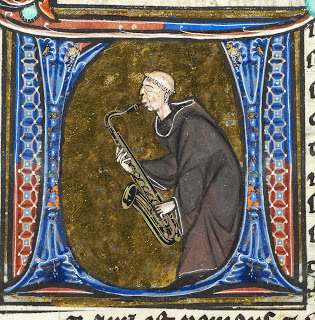 Jesus says that everyone who does not renounce all his possession cannot be his disciple. Can this be true? For that matter, can he really be asking us to hate our parents? If our eye offends us, must we really gouge it out? And how are we to pray without ceasing? Christ, it seems, is constantly asking the impossible.
Jesus says that everyone who does not renounce all his possession cannot be his disciple. Can this be true? For that matter, can he really be asking us to hate our parents? If our eye offends us, must we really gouge it out? And how are we to pray without ceasing? Christ, it seems, is constantly asking the impossible.I had a friend speak to my Ethics class many years ago. This was someone I had met at Oxford. He was working now in the world of high finance. And by that I mean he had recently closed a deal to buy a business for nineteen billion dollars. He was also—and still is—a devout Catholic.
After his talk was over, one of my students (his name was Chad) asked him, “Are you rich?”
He answered in the affirmative.
“Really rich?” said Chad.
He nodded. “I have a house on the beach in San Trope.”
“But you are totally detached from that money.”
Again, my friend nodded: “I try to be.”
“Great!” said Chad. “Can I have some?”
There was a little gasp from the class. We all knew he wasn’t just going to give away his money to some high school senior he had never met. But on the other hand, if he was truly detached from his money, maybe he would.
My friend closed his eyes for a moment or two, and then he said, “No.”
“But I thought you were detached from your money,” Chad protested.
“When push comes to shove,” said my friend, “it is not my money at all. It is on loan to me by God. Everything is on loan to me by God: my money, my home, my life, my children…none of them, properly speaking, belong to me. Which is why I must be doubly careful how I treat them. If God was calling me to give away my money, I hope I’d be detached enough to do so; but it’s precisely because the money is not mine that I must dispose of it with great care.”
I can’t speak for the wisdom of my friend’s fiscal decisions. I haven’t paid income tax in twenty-two years. But I like to think that he and I have this in common: each, in the context of our unique vocation has renounced his possessions to be a disciple. One of us, however, has a four-bedroom house on the beach in San Trope. The other has a twenty-five-bedroom house in Creve Coeur, Missouri. <!-- /* Font Definitions */ @font-face {font-family:"Cambria Math"; panose-1:2 4 5 3 5 4 6 3 2 4; mso-font-charset:0; mso-generic-font-family:roman; mso-font-pitch:variable; mso-font-signature:3 0 0 0 1 0;} @font-face {font-family:Calibri; panose-1:2 15 5 2 2 2 4 3 2 4; mso-font-charset:0; mso-generic-font-family:swiss; mso-font-pitch:variable; mso-font-signature:-536859905 -1073732485 9 0 511 0;} /* Style Definitions */ p.MsoNormal, li.MsoNormal, div.MsoNormal {mso-style-unhide:no; mso-style-qformat:yes; mso-style-parent:""; margin:0in; margin-bottom:.0001pt; mso-pagination:widow-orphan; font-size:12.0pt; font-family:"Calibri",sans-serif; mso-ascii-font-family:Calibri; mso-ascii-theme-font:minor-latin; mso-fareast-font-family:Calibri; mso-fareast-theme-font:minor-latin; mso-hansi-font-family:Calibri; mso-hansi-theme-font:minor-latin; mso-bidi-font-family:"Times New Roman"; mso-bidi-theme-font:minor-bidi;} .MsoChpDefault {mso-style-type:export-only; mso-default-props:yes; font-family:"Calibri",sans-serif; mso-ascii-font-family:Calibri; mso-ascii-theme-font:minor-latin; mso-fareast-font-family:Calibri; mso-fareast-theme-font:minor-latin; mso-hansi-font-family:Calibri; mso-hansi-theme-font:minor-latin; mso-bidi-font-family:"Times New Roman"; mso-bidi-theme-font:minor-bidi;} @page WordSection1 {size:8.5in 11.0in; margin:1.0in 1.0in 1.0in 1.0in; mso-header-margin:.5in; mso-footer-margin:.5in; mso-paper-source:0;} div.WordSection1 {page:WordSection1;} -->
October 2, 2019
Happy Feast Day to Nurses Everywhere!
 It occurred to me after my surgery that the work of an angel and the vocation of the nurse are the same. But it occurred to me today that in particular the vocation of the nurse is to be a guardian angel: to communicate, to protect, to console, to comfort, and to give direction.
It occurred to me after my surgery that the work of an angel and the vocation of the nurse are the same. But it occurred to me today that in particular the vocation of the nurse is to be a guardian angel: to communicate, to protect, to console, to comfort, and to give direction.Which explains why angels always start with, “Do not be afraid!” That’s a lot of power to have over someone. Here’s what the catechism says about guardian angels: From its beginning until death, human life is surrounded by their watchful care and intercession. Beside each believer stands an angel as protector and shepherd leading him to life. Already here on earth the Christian life shares by faith in the blessed company of angels and men united in God [CCC 336].
That sounds to me like the job of a nurse: watchful care and intercession…protecting the patient and leading him to life. So today I offer this prayer for you and for your sister nurses:Angel of God,
my guardian dear,
to whom God's love
commits me here,
ever this day,
be at my side,
to light and guard,
rule and guide.Amen.May god strengthen you in your ministry of light, guardianship, leadership and guidance.
September 8, 2019
Practice and Prayer
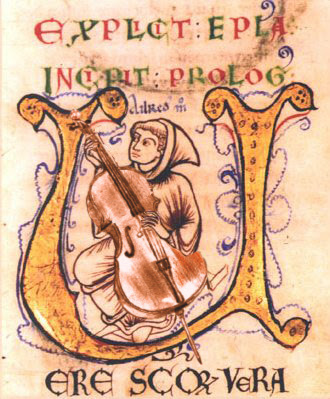 Homily to Saint Anselm Parish
Homily to Saint Anselm ParishAs most of you know, I will be having surgery on my brain this Thursday to correct eighteen years reckless rugby, so I would appreciate the prayers. The prognosis is good. I met with the surgeon a month ago, and he told me it was entirely likely that the tremors in my right arm and leg might disappear entirely. Of course, I asked him if I’d be able to play the violin. He said that was entirely possible…which is strange, because I’ve never been able to play the violin.
I know this because the last term of my senior year of college, I decided that I needed to learn how to play a musical instrument. So I walked into the lobby of the Shephard School of Music at Rice University and signed up for violin lessons. They handed me a $20,000 violin, appointed a tutor to give me lessons, and I was off.
It was a disaster.
No one starts the violin at 22. It’s the kind of instrument you have to grow into. And it can be years before you can begin to produce anything resembling a melody. What’s more (and I learned this within the first few days) no one wants to share a dorm room with a beginning violinist.
By the end of the semester, I had alienated my roommates, my teacher, my guidance counselor, and cultivated a deep and visceral abhorrence for sheet music. My recital was so painful, one of the three grad students compelled to be in the audience actually gagged.
This is what happens when you make a life-changing decision without stopping to consider the consequences. And yet, often this is how we approach the spiritual life. Without training, practice, perseverance or guidance, we jump right in, expecting God to respond with gratitude. And when we don’t see immediate results, we despair. Granted, there’s nothing wrong with extemporaneous prayers, and you don’t need a degree in Theology to talk to God…but how often, and how quickly do we become frustrated when our early attempts are not met with spiritual consolations? “I don’t go to mass because I don’t get anything out of it.” Of course you don’t get anything out of it. You don’t put anything into it. I don’t get anything out of basketball; but that’s no surprise because I don’t practice. “Prayer,” said Saint Teresa of Avila, “must be accompanied by reflection. A prayer in which a person is not aware of Whom he is speaking to, what he is asking, who it is who is asking and of Whom, I don't call prayer, however much the lips may move.”
I remember listening to my tutor play, and saying, “Golly, I wish I could play like that.”
“There’s really nothing to it,” he answered. “Just keep practicing two hours a day for the next eighteen years.”
Why should prayer be any different? Everyone understands that brain surgery takes practice and study; golf takes practice and study; plumbing takes practice and study; no one would just get up one morning and decide to rewire their home. All these things., it is understood, require training and forethought. Yet when it comes to art and prayer, suddenly everyone’s an expert.
Jesus warns us against this kind of presumption: Which of you wishing to construct a tower does not first sit down and calculate the cost? When it comes to your spiritual life, it’s your soul on the line. The stakes are eternal, and the cost is everything. So it’s worth investing some real thought and work in preparation.
As Catholics, we have an inexhaustible wealth of resources to draw on: sacraments, saints, scripture, and tradition. “Are you making no progress in prayer?,” wrote Saint Margaret Mary Alacoque. “Then you need only offer God the prayers which the Savior has poured out for us in the sacrament of the altar. Offer God His fervent love in reparation for your sluggishness. And unlike learning the violin, it’s never too late. It’s all well within our reach. All is grace. All is offered without charge and without limit; so we have only to reach out and take it. But take it we must.
The deliberations of mortals are timid, and unsure are our plans; but of this we can be assured: every prayer is heard. Every hour spent in prayer is productive. Thus are the paths of those on earth made straight. And may the gracious care of the LORD our God be ours; prosper the work of our hands for us!
May 27, 2019
Sermon to the Priory School Eighth Grade “Graduating” Class
Father Augustine Wetta, O.S.B.
Congratulations, gentlemen. As of today, the Feast of Saint Bede, the Venerable, you are freshmen. In two years, you will be driving. In three years, you will receive a gold ring that bears a coat of arms registered with the College of Heralds of Great Britain. You will take your SATs, write a thesis, go to prom, dig your very own mud pit…and exactly four years from today, your valedictorian will stand in this very church and give a speech that will sound something like this (I’ve edited out the boring parts, and will just sazy blah blah blah instead:
Parents, faculty, monks, and esteemed students of the Saint Louis Priory School, it is a great honor to be here blah blah blah we will always be brothers blah blah blah ups and downs, blah blah blah insert funny story here blah blah blah something about God blah blah blah never thought we’d make it blah blah blah but with a Priory education you can do anything so long as you to put your mind to it. Blah blah blah Thank you.
I’ve heard a lot of graduation speeches. And not all of them sounded exactly like that; but enough did that I finally sat down and wrote my own graduation speech. Predictably, I’ve never been asked to give it.
Until now.
So in leau of a sermon, here it is: my graduation speech to the class of 2023:
Parents, faculty, monks, and esteemed students of the Saint Louis Priory School, You are all going to fail. Over the next few years, you will all, inevitably, have your hearts broken, experience loneliness, miss a major opportunity, lose a game, lose a job, lose some money, be abandoned and ridiculed, be humiliated and scorned. You, my friends, are destined for failure. And that is very, very sad. But it’s also ok because your God had his heart broken and was ridiculed by his friends. Your God was humiliated and scorned and abandoned. And that means that your dignity is not bound up with your success. You are a child of God. You have been divinized. And in the end, when you lie on your deathbed as we all inevitably do, without trophies or diplomas or accolades or even your bodily health to comfort you, ALL that will matter is your existence as a child of God, and it will be enough. That will be more than enough. That will be everything.
Laus Tibi Domine
Praise to You, O Lord, Father, Son, and Holy Spirit
